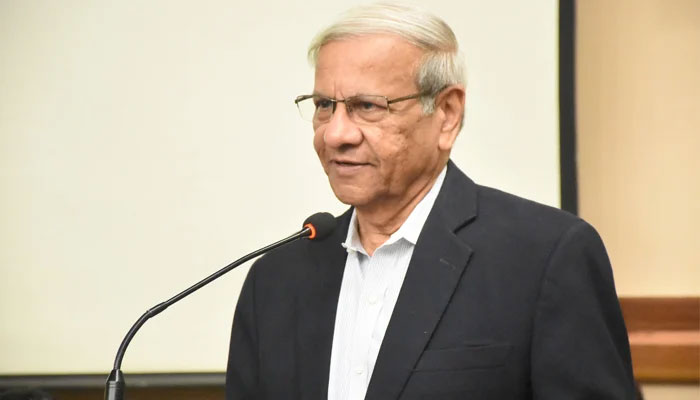Cities can drive economic growth only if they are livable and attract talented youth: Bengali
‘Roti, Kapra aur Makaan’ (food, clothing, and housing) encapsulates the fundamental needs of a person, and the government must adopt effective policies to ensure these essentials are provided to the public, economist Dr Kaiser Bengali said on Friday.
He expressed these thoughts during a lecture titled 'Charter of Economy for Sindh' at the Applied Economics Research Centre of the University of Karachi. He emphasised that the government should safeguard both the household and macro-economies by implementing proper flood management in the province to prevent food insecurity and homelessness. He pointed out that Sindh's land was capable of producing essential food items such as wheat, pulses, onions, cooking oil, vegetables and spices, and all these should be cultivated within the province.
He argued against the reliance on importing essential food items, as imports were subject to the rising costs of foreign exchange, contributing to inflation and adversely impacting lower-income households. He suggested that acreage should be fixed district-wise to produce the required quantities and proposed that a necessary incentive structure be instituted to provide growers with reasonable returns. The economist said the government should ensure that people had access to housing, water supply, wastewater disposal, electricity and gas, along with a clean, orderly neighbourhood, while also providing employment opportunities, as the overarching need for survival was employment.
He mentioned that employment could be easily generated by commodity sectors of the economy, primarily agriculture and industry. Dr Bengali highlighted that floods frequently affected Sindh, causing massive damage to public infrastructure and erasing private assets accumulated through years of labour. He recommended minimising the devastation by removing all encroachments that distorted the natural flow of water and obstruct the evacuation of floodwaters.
"Lay a forest belt alongside the Indus to protect bunds from erosion, remodel the drainage network to allow flood/rainwater to escape towards the river," he commented. He emphasised the need for identifying rural growth centres (RGC) and prioritise them for resource allocation for developing economic and social infrastructure and facilities. "Each of these RGCs must be equipped with quality housing, a high school and college for boys and girls, a hospital, a modern market centre, and a small industrial park," he added.
The economist opined that cities were growth engines but could only contribute to economy if they were liveable and attract educated and enterprising youth to reside and lead the development process.
He stressed the importance of infrastructure works for agriculture, industry, housing, and flood protection, urging the government to provide incentives for reviving these industries. He added that a decentralised local government system with a fiscal distribution mechanism based on efficiency and equity criteria would help achieve these targets.
KU Vice Chancellor Professor Dr Khalid Mahmood Iraqi said one reason for the country's economic decline is that rulers avoided making difficult decisions, and there was a lack of policy continuity, resulting in negative effects on the economic structure.
He suggested that in addition to demanding rights at the government level, the public should seek solutions to alleviate the country's problems. He observed that citizens should also realise their responsibilities to progress in the right direction.
-
 Heavy Snowfall Disrupts Operations At Germany's Largest Airport
Heavy Snowfall Disrupts Operations At Germany's Largest Airport -
 Andrew Mountbatten Windsor Released Hours After Police Arrest
Andrew Mountbatten Windsor Released Hours After Police Arrest -
 Heidi Klum Eyes Spooky Season Anthem With Diplo After Being Dubbed 'Queen Of Halloween'
Heidi Klum Eyes Spooky Season Anthem With Diplo After Being Dubbed 'Queen Of Halloween' -
 King Charles Is In ‘unchartered Waters’ As Andrew Takes Family Down
King Charles Is In ‘unchartered Waters’ As Andrew Takes Family Down -
 Why Prince Harry, Meghan 'immensely' Feel 'relieved' Amid Andrew's Arrest?
Why Prince Harry, Meghan 'immensely' Feel 'relieved' Amid Andrew's Arrest? -
 Jennifer Aniston’s Boyfriend Jim Curtis Hints At Tensions At Home, Reveals Rules To Survive Fights
Jennifer Aniston’s Boyfriend Jim Curtis Hints At Tensions At Home, Reveals Rules To Survive Fights -
 Shamed Andrew ‘dismissive’ Act Towards Royal Butler Exposed
Shamed Andrew ‘dismissive’ Act Towards Royal Butler Exposed -
 Hailey Bieber Shares How She Protects Her Mental Health While Facing Endless Criticism
Hailey Bieber Shares How She Protects Her Mental Health While Facing Endless Criticism -
 Queen Elizabeth II Saw ‘qualities Of Future Queen’ In Kate Middleton
Queen Elizabeth II Saw ‘qualities Of Future Queen’ In Kate Middleton -
 Amanda Seyfried Shares Hilarious Reaction To Discovering Second Job On 'Housemaid': 'Didn’t Sign Up For That'
Amanda Seyfried Shares Hilarious Reaction To Discovering Second Job On 'Housemaid': 'Didn’t Sign Up For That' -
 Hilary Duff Reveals Deep Fear About Matthew Koma Marriage
Hilary Duff Reveals Deep Fear About Matthew Koma Marriage -
 Will Sarah Ferguson End Up In Police Questioning After Andrew’s Arrest? Barrister Answers
Will Sarah Ferguson End Up In Police Questioning After Andrew’s Arrest? Barrister Answers -
 Matthew McConaughey Gets Candid About AI Threat To Actors: 'Be Prepared'
Matthew McConaughey Gets Candid About AI Threat To Actors: 'Be Prepared' -
 Hailey Bieber Shares How 16-month-old Son Jack Blues Is Already Following In Justin Bieber's Footsteps
Hailey Bieber Shares How 16-month-old Son Jack Blues Is Already Following In Justin Bieber's Footsteps -
 Zuckerberg Denies At LA Trial That 'Instagram Targets Kids' Amid Addiction Claims
Zuckerberg Denies At LA Trial That 'Instagram Targets Kids' Amid Addiction Claims -
 France Sees Record 102mn International Tourists In 2025
France Sees Record 102mn International Tourists In 2025




